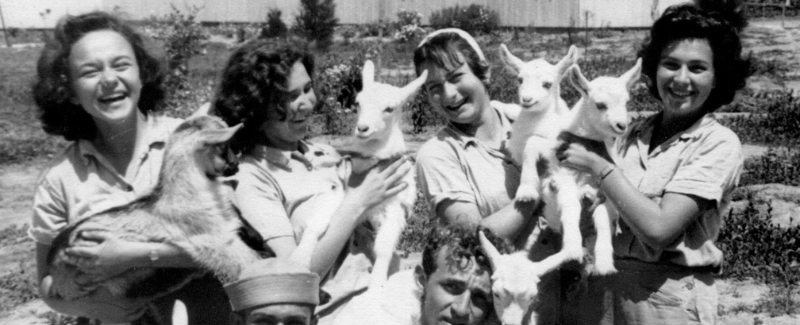About Hebrew
Gathering at the Kibbutz

Raise your hand if your heart was bursting with pride the first time you visited an Israeli kibbutz—that unique experiment in communal living and working the land.
Stories about the root ק-ב-צ (kuf–bet–tsadi), to gather, will cause many a Zionist’s heart to flutter as well. While each of the two biblical nouns for “collective settlement,” קִבּוּץ (kibbuts) and קְבוּצָה (kevutsah), appears in Scripture, the source of our root is not the Hebrew Bible. According to etymologist Ernest Klein, the term kibbutz was borrowed from an annual Hasidic הִתְקַבְּצוּת (hitkabtsut), gathering, at the tomb of Rabbi Nachman of Breslov, founder of the Breslov Hasidic movement, called הַקִּבּוּץ הַקָּדוֹשׁ (ha-kibbuts ha-kadosh), the Holy Gathering.
In Scripture, Isaiah uses the root to prophesy that קִבּוּצַיִ (kibbutsai’ikh), “your groups,” of pagan idols will not avail you. Ezekiel compares fellow Israelites to base metals that one day will be smelted into קְבוּצַת כֶּסֶף (kevutsat kessef), “a collection of silver.” In Genesis, Joseph offers Pharaoh his services as director of economic planning for the coming famine, suggesting, וְיִקְבְּצוּ (ve-yikbetsu), “Let them gather,” food during the seven good years and save it for the following seven bad years. The Book of Proverbs offers more modest wisdom, וְקֹבֵץ עַל יָד יַרְבֶּה (ve-kovets al yad yarbeh), “One who gathers little-by-little increases wealth.”
Our root shows up in a host of Hebrew words, from the return to Israel that is קִבּוּץ גָּלוּיוֹת (kibbutz galuyot), “the ingathering of the exiles,” to a קֹבֶץ (kovets), collection, of essays about the proverbial Jewish קַבְּצָן (kab’tsan), panhandler. Today, a medical chart at one of Hadassah Medical Organization’s two hospitals will include the patient’s קְבוּצַת דָם (kevutsat dam), blood type, while news reports about hardball Israeli politics will often focus on קְבוּצוֹת לַחַץ (kevutsot lahats), pressure groups.
 Missed our webinar? Watch the recording here.
Missed our webinar? Watch the recording here.
In 1941, religious German Zionists built קִבּוּץ קְבוּצַת יַבְנֶה (Kibbutz Ke-vutsat Yavneh) using in its name both terms derived from our root. This year, Hadassah proudly celebrates—alongside Israel’s 75th anniversary—the 50-year jubilee of making the desert bloom at קִבּוּץ קְטוּרָה (Kibbutz Ketura), founded by a group of Young Judaea graduates.
It’s Friday afternoon, erev Shabbat at the kibbutz, and the visitor imagines a מִקְבַּץ (mikbats), cluster, of kibbutz girls, each dressed in a white חֲצָאִית מְקֻבֶּצֶת (hatsa’it mekubbetset), pleated skirt, heading together to synagogue.
If you will it, as Theodor Herzl might have taught, etymology is not merely a story about words.
Joseph Lowin’s columns for Hadassah Magazine are collected in the books HebrewSpeak, Hebrew Talk and the recently published Hebrew Matters, available at gcrr.org/product-page/hebrew-matters.










 Facebook
Facebook Instagram
Instagram Twitter
Twitter
Leave a Reply